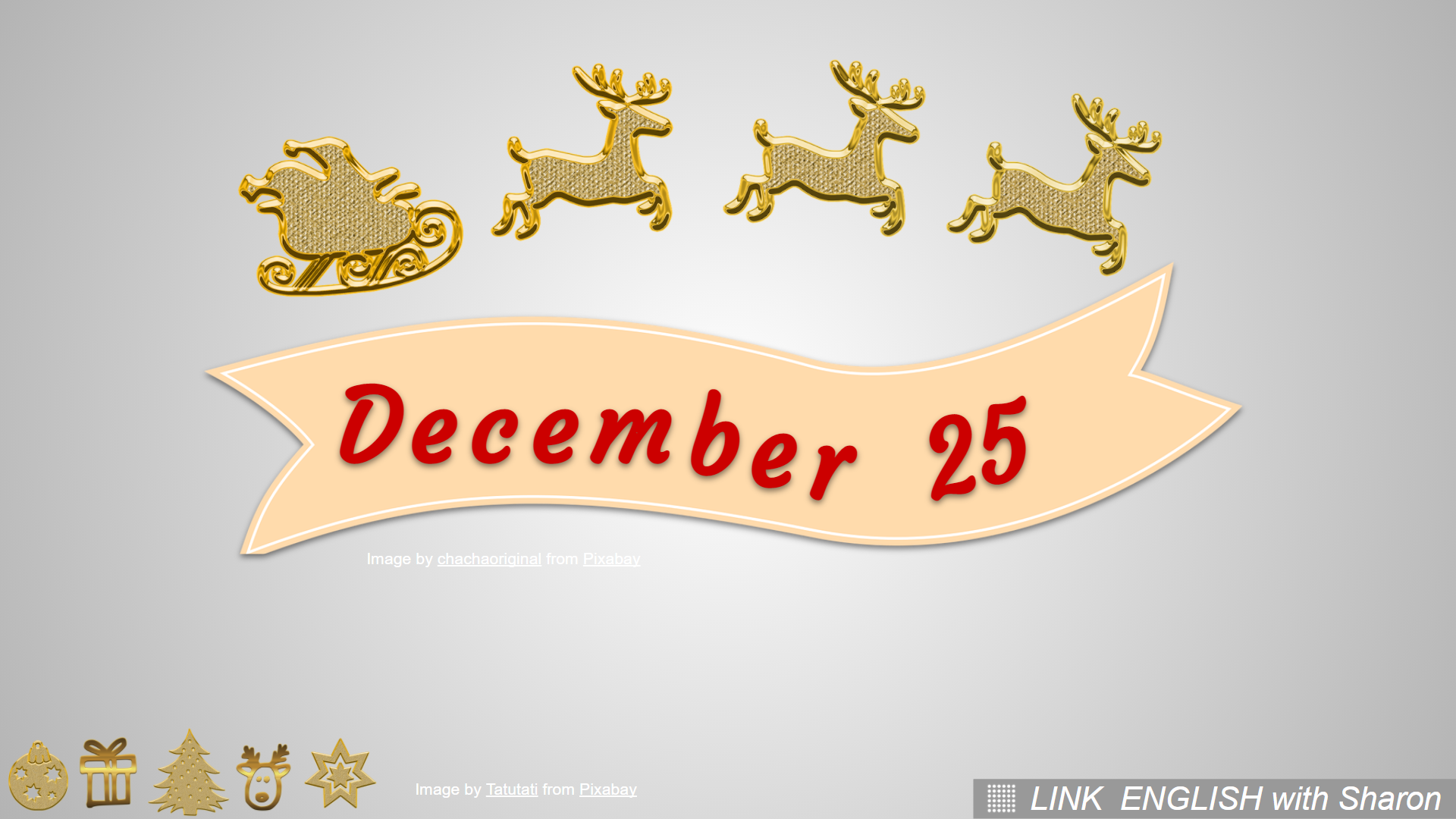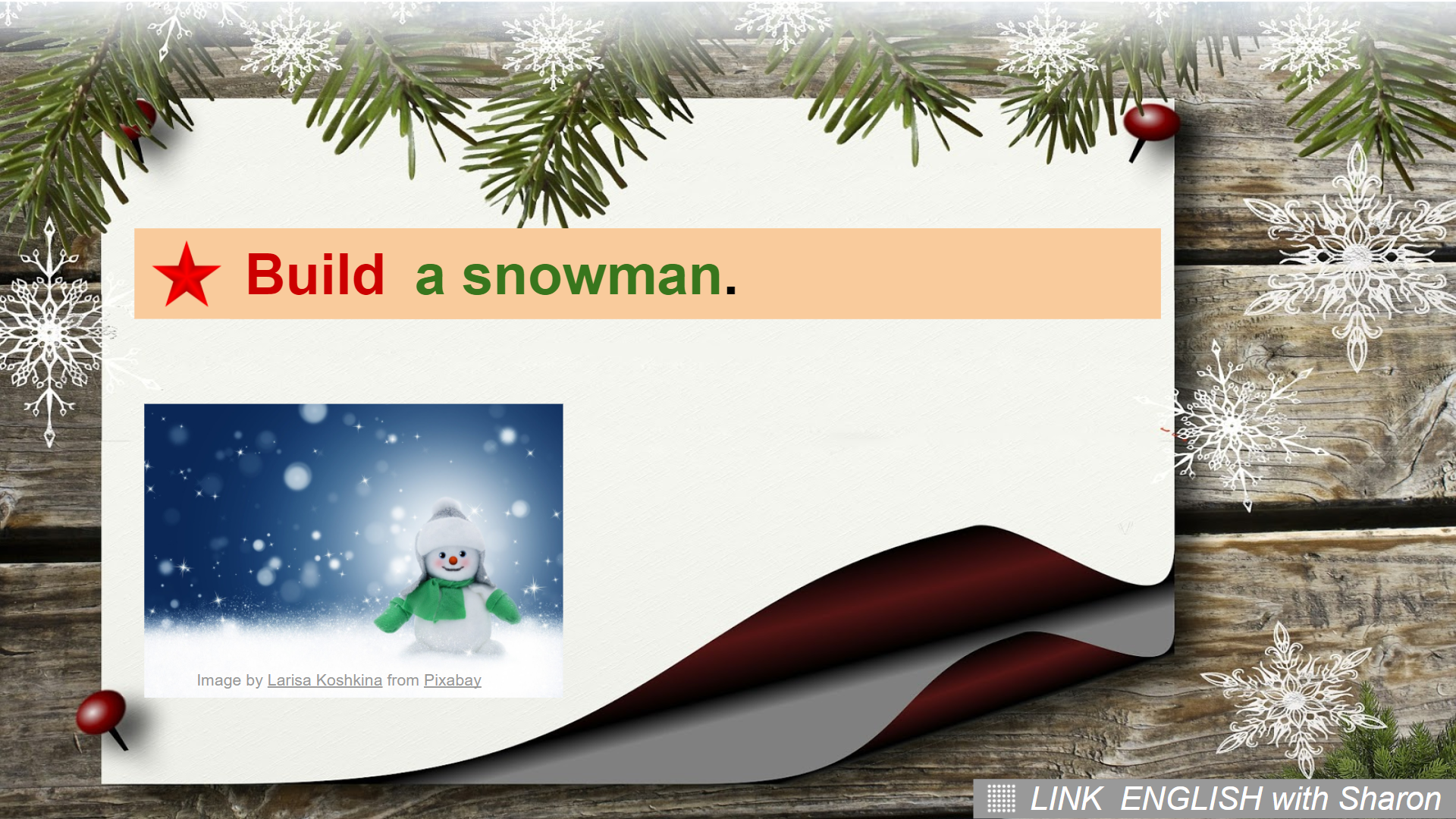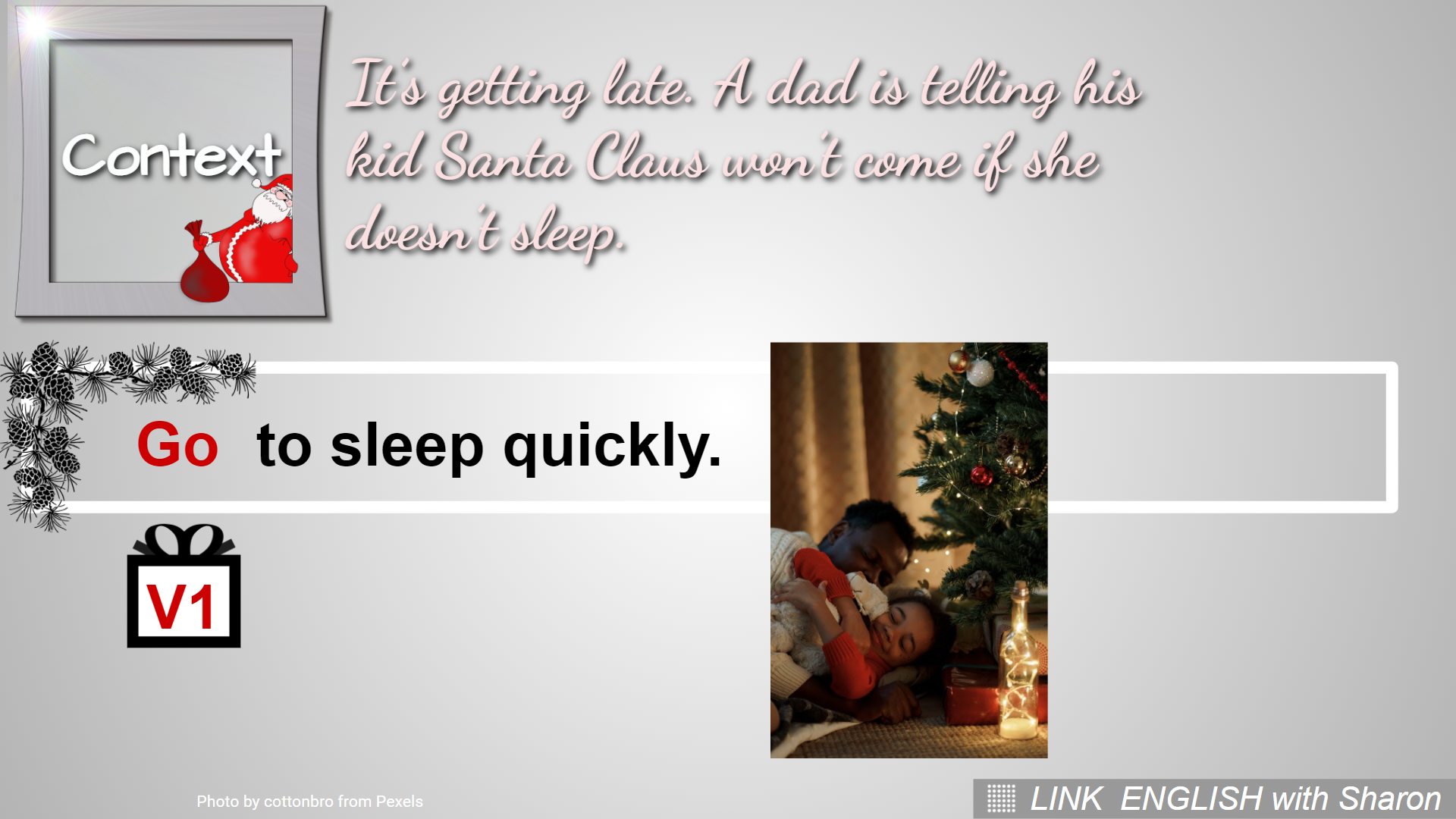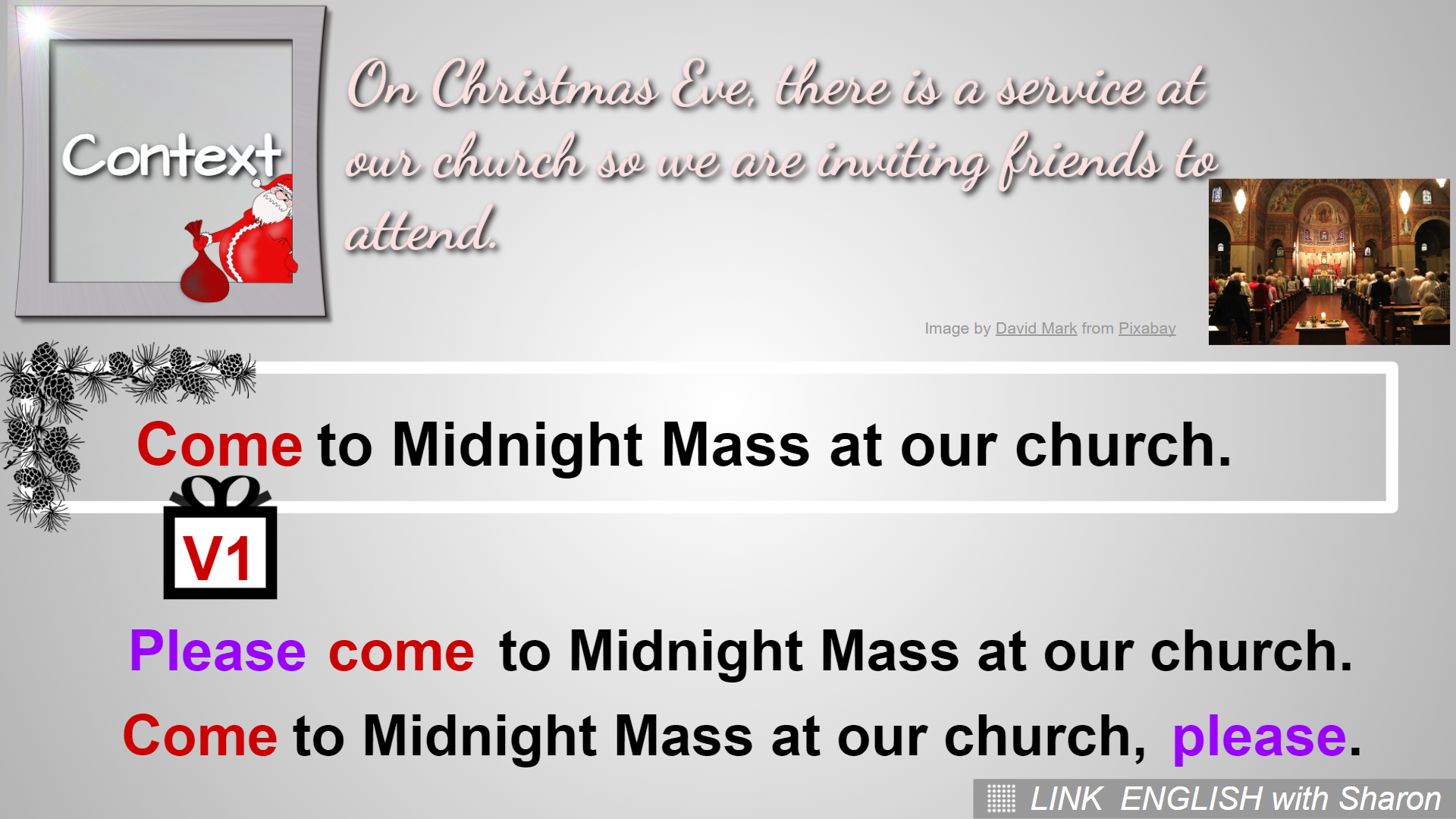Easy Way to Learn English Verb Tenses / TALK! (IMPERATIVE)
CHRISTMAS IS COMING TO TOWN

December 25 is coming and it is Christmas! Therefore, we are going to learn verb tenses with a Christmas feeling.
VERB FORMS

Every English verb can be changed into five forms the most. Let's look at two examples:
1. come
V1-come (infinitive), V2-came, V3-come, V4-coming, V5-comes
2. talk
V1-talk, V2-talked, V3-talked, V4-talking, V5-talks
This lesson targets V1 form and those V1 verbs will be used only in the situations where we do not need subjects.
SENTENCES WITHOUT SUBJECTS

An English sentence usually has a subject, someone or something, and an action or a state, meaning a condition.

For example:
Santa will come to my place!
This sentence has a subject, 'Santa', and an action, 'will come to my place'.

In this lesson, we only discuss those sentences without subjects but just actions, using V1 verbs. For example:
'Com to my place!'
LESSONS ON V1 VERBS

V1 verbs can be used in many different situations and you can learn all of them in these different lessons:
Lesson - 'Talk!'
Lesson - 'We talk.'
Lesson - 'will talk'
Lesson - 'should talk'
SITUATION 1 - MAKE A LIST

The first situation where we use V1 verbs in a sentence without subjects is when we make a list. In the following we are going to make a to-do list for Christmas.

* Decorate the tree with ornaments. [V1: decorate]
With a beautiful Christmas tree, the house is filled with Christmas ambience.

* Make a wreath for the front door. [V1: make]
A wreath on the front door will definitely give your guests a warm welcome.

* Hang stockings. [V1: hang]
You can hang stockings to decorate your home AND to receive gifts from Santa.

* Wrap presents. [V1: wrap]
Prepare presents and wrap them nicely for your family and even friends.

* Hide the elf or elves on a shelf. [V1: hide]
At the beginning of the Christmas season, the elves are everywhere in the house as Santa's eyes and ears checking if the kids are behaving.

* Build a gingerbread house. [V1: build]
Gingerbread is a Christmas delicacy and building a gingerbread house is fun. However, you can buy one too.

* Eat a candy cane. [V1: eat]
You can often see candy canes over Christmas because the 'J' shape looks like a shepherd's crook and shepherds visited baby Jesus.

* Bake Christmas cookies. [V1: bake]
You can bake some Christmas cookies for parties or for Santa. Why? Look at the next activity on the list.

* Leave cookies for Santa Clause. [V1: leave]
Santa Clause works so hard to deliver gifts so let's prepare some cookies for him.

* Go ice skating. [V1: go]
Some outdoor activities are a good idea during the holidays.

* Build a snowman. [V1: build]
If there is snow in your neighborhood, you can build a snowman.


* Swim at the beach. [V1: swim]
People living in the southern hemisphere enjoy going to the beach for fun during Christmas holidays.

* Kiss someone under the mistletoe. [V1: kiss]
This is a well-known Christmas tradition. According to a story, the mistletoe is the symbol of love so you can kiss someone you like if both of you stand under the mistletoe.
You can see that V1 verbs are used in all of the activities on this to-do list.
SITUATION 2 -
INSTRUCTIONS / SUGGESTIONS / INVITATIONS


Context: I am reading the recipe for Christmas turkey.
Example: Baste the turkey at regular intervals. [V1 verb: baste]
According to the recipe, when we roast the turkey for Christmas dinner, we should pour oil or liquid over the turkey from time to time. V1 verb is used in this instruction.

Context: It's getting late. A dad is telling his kid Santa Claus won't come if she doesn't sleep.
Example: Go to sleep quickly. [V1 verb: go]
Depending on the tone, nice or mean, this can be a suggestion or an order. This father uses V1 verb to give this suggestion or order.

Context: On Christmas Eve, there is a service at our church so we are inviting friends to attend.
Example: Come to Midnight Mass at our church. [V1 verb: come]
Example: Please come to Midnight Mass at our church. [more polite with 'please']
Example: Come to Midnight Mass at our church, please. [more polite with 'please']
Midnight Mass is usually held on the night of Christmas Eve. If we want to make this invitation sound more polite, 'please' can be added at the beginning or the end of the sentence. Use a comma before adding 'please' at the end of the sentence.
Watch the video and create your own sentences following the examples. Listening and speaking are the key to learning a language.
[Reminder] Watch the video before starting reading the text and you can see all the pictures together if you click on one of them! You can also use the 'Translate' tool on the blog to help you understand the text. What's better, all the key vocabulary in my examples ranges from elementary to advanced levels (CEFR: A1~C2 / IELTS: 1~9) so you will learn a lot of English words if you keep studying each lesson. You will also benefit more if you use a dictionary to help you. Finally, don't forget to use English in daily life so all the grammar/vocabulary can be stored in your mind easier. While using this language, you are also learning from others and observing when is the appropriate context for different usages.





Comments
Spoken English Class In T Nagar Chennai